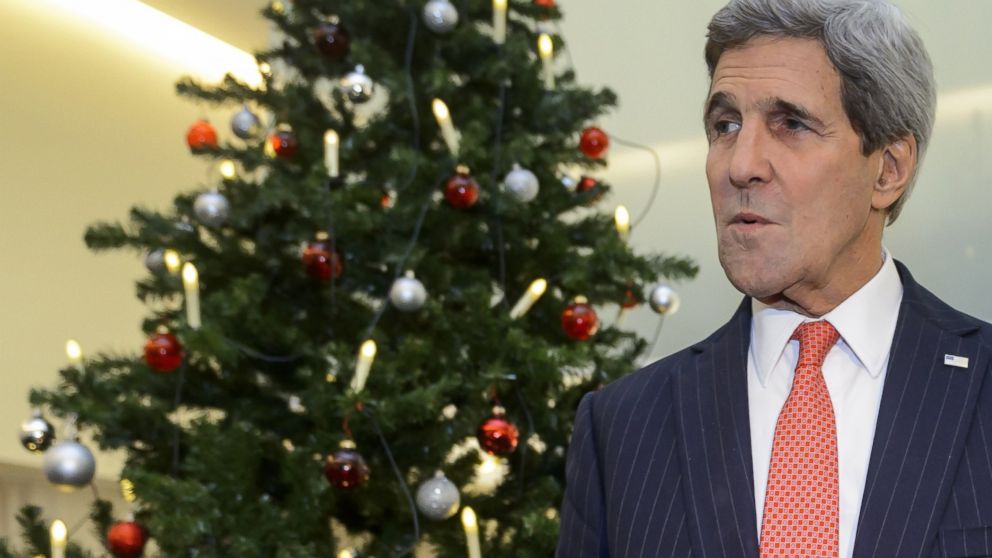Middle East Peace, Iran Deal on Kerry's Wish List
And what he's likely to end up getting.

— -- This holiday season, Secretary of State John Kerry is probably looking for some things that can’t fit down a chimney or under a tree. Here’s a look at a few items that are likely on his wish list – plus what he’s more likely to get in the New Year.
Wish: Peace in the Middle East
Kerry has been chasing peace between Israelis and Palestinians since July 2013, when he helped broker an agreement that brought both sides back to the negotiating table. Although fighting resumed between Hamas and Israel this summer, Kerry has never stopped sounding optimistic over the prospect of returning to long-term talks. “I’m confident that the people of Israel are as interested in peace as are the people in Palestine, in the West Bank, in Jordan, and in the region,” he said last Wednesday.
Reality: With Israel and Hamas still trading fire as recently as this weekend, Kerry will likely have to settle for far less lofty goals. One is preventing the Palestinians from holding a vote in the United Nations Security Council on statehood, at least before the Israeli prime ministerial elections in March, said David Makovsky, a former adviser on Kerry’s peace team. “You could argue certainly the Security Council resolution in this environment will help [Prime Minister Benjamin] Netanyahu because he will be able to assume the role he enjoys the most, which is he is the guardian of Israel against international pressure,” Makovsky said. “I think the U.S. does not want to be a factor in the Israeli election.”
Wish: An Iran Nuclear Deal
The June 2013 election of Iranian President Hassan Rouhani, who promised a “path of moderation,” gave the United States and its negotiating partners a new opportunity to negotiate with Iran over its nuclear program. Kerry sounded optimistic in November 2013, shortly after talks with Iranian nuclear negotiator Mohammad Zarif began: “Our hope is that President Rouhani and Foreign Minister Zarif want to build this different relationship, want to show in clear ways as we go forward that the program is peaceful.”
Reality: Talks have been extended for a third time until July, and with the incoming Republican congressional majority in 2015, success is even more precarious. Most Senate GOPers have already pledged to block almost any deal that comes out of this round. What seems most likely to happen this year is a vote on a trigger for new sanctions against Iran.
Wish: Meaningful Climate Change Action
Kerry made headlines in February when he said climate change represents as big a threat to America as terrorism and urged the world “approach this problem with the cooperation, the urgency, and the commitment that a challenge of this scale warrants.” And the administration earned plaudits in November when it agreed to a greenhouse gas-cutting deal with China, in which the United States committed to cutting emissions below 2005 levels by 2025.
Reality: Cutting emissions to those levels is not enough, said Karen Orenstein, the senior international policy analyst at Friends of the Earth. She praised Kerry’s rhetorical focus on climate change, but said the agreement is “totally out of sync with what science demands from the U.S. in order to keep the world from catastrophic climate change.” Next year is also the year Kerry could make a decision over the Keystone XL pipeline, a rallying point for both liberal and conservative climate activists. His State Department is in charge of making a recommendation to Obama over whether to go forward with the project.




